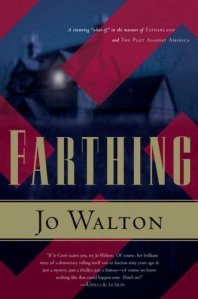 Jo Walton’s a badly underrated writer. She’s not underrated by speculative fiction awards committees, just the public consciousness. Since the start of her career in 2000, Walton has won the World Fantasy Award, the Prometheus Award, the Nebula, and the Hugo (these last two for the same book). She could be the most decorated author you’ve never heard of.
Jo Walton’s a badly underrated writer. She’s not underrated by speculative fiction awards committees, just the public consciousness. Since the start of her career in 2000, Walton has won the World Fantasy Award, the Prometheus Award, the Nebula, and the Hugo (these last two for the same book). She could be the most decorated author you’ve never heard of.
Which is a shame. Walton does fluffy society novels, but twists them in ways you’ve never seen before. I was first introduced to her work by her 2002 novel, Tooth and Claw. It’s Pride and Prejudice if every character in it were a dragon. It’s a world where a maiden dragon’s need to maintain her “virtue” is dictated not just by custom but by biological reality.
Farthing starts out like a fluffy society novel, too. It’s set in an alternate 1949 where Britain and the Third Reich have fought it out to a draw and signed a peace treaty. At the start of our book, a bunch of flighty British nobles are cooped up in a friend’s country house for a weekend party. Sunday morning, one of the upper-class twits is discovered dead. While Inspector Carmichael tries to solve the mystery, he’s exposed to the antics of Lucy Kahn, née Eversley, a debutante who married a Jewish man, and her mother, who’s never forgiven Lucy for it. He wades through speculation about who’s sleeping with whose sister, who’s sleeping with whose servant, and who’s sleeping with other men. We see upstairs-downstairs as the servants split into factions, the ones who support Lucy’s marriage and the ones who don’t. There’s also a lot of wrangling over the difference between India tea and China tea, which still leaves me puzzled. Are these black tea and green tea, respectively?
It’s all quite amusing and fluffy until it slowly dawns on you that George Orwell is writing the novel.
That’s all I’ll say about how it ends. Though it’s a testament to Walton’s skill as a writer that while this is technically a sad ending, she manages to fill it with so much hope.
